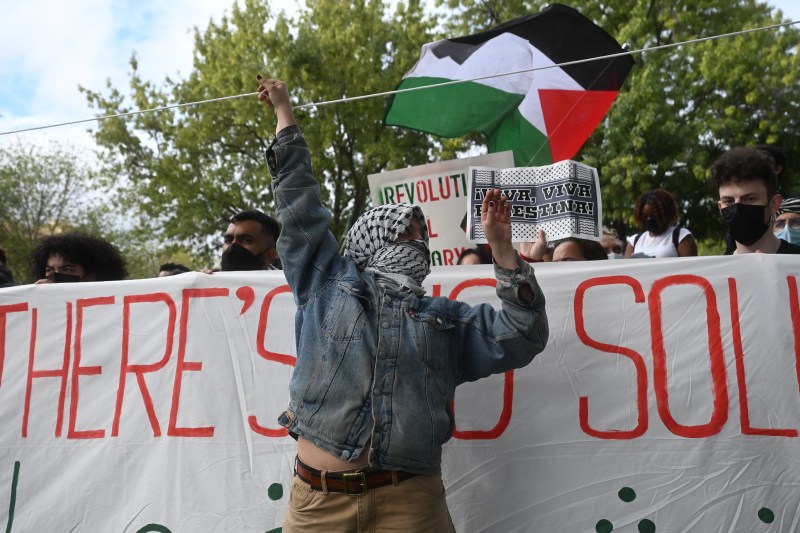When I attended Stanford in the 1960s, I led the campus protest movement against the Vietnam War. I was focused on effective persuasion, not venting my anger and causing disruption. Let alone violence. Let me tell that story — and how it governed my 40 years as a public policy advocate. It explains why the current protests against Israel’s conduct in its war against Hamas have been so completely ineffective.
Early in my sophomore year, I came to believe that the Vietnam War was a total mistake. An outrage. America had become the new colonial power in Southeast Asia, replacing the French. I did not believe that Vietnam would become a satellite of Communist China (and it didn’t). So, once a week, I set up a table in White Plaza and handed out white armbands to those who felt the same way. When I started in late 1964, hardly anyone took an armband. Many students would yell at me. Some threatened me. Then when I graduated in 1967, I organized a protest in which about 25% of the students wore white armbands to the graduation. It was perhaps the first protest at a Stanford graduation. We were visible and respectful and, I am sure, effective.
On a parallel track, in the summer of 1965, I landed my first Stanford in Government internship on Capitol Hill. I participated in many anti-Vietnam War protests but didn’t bring these into my Hill office, which might have destroyed my internship.
Back on Capitol Hill as a SIG intern in 1967, I organized speakers for the SIG interns.
We met with Secretary of State Dean Rusk, the leading advocate, at the time, for the Vietnam War. I sat next to him, and at the end I asked, “How are we going to persuade the Vietnamese to back us when we’re acting like the new colonial power, after the French?” He glowered at me and perhaps wanted to slug me. Instead, he left without answering my question.
That summer, my roommate was a close friend of Al Lowenstein (formerly a dean at Stanford), who was busy on Capitol Hill recruiting a senator to run for president in the 1968 Democratic primaries on an anti-war platform. He landed Eugene McCarthy. In 1968, I went “clean for Gene” — now focusing on the political process and again not venting and disrupting. I worked in multiple primaries and was in a McCarthy storefront in Milwaukee when President Lyndon Johnson dropped out. We won in the political trenches, not the streets. All of us believed that our student pressure on Johnson had forced him to end his reelection campaign. The political process had worked.
When I graduated from Stanford, I was accepted into the Peace Corps but deferred to attend law school. But in February 1968, all graduate deferments from the draft were ended. I planned to refuse induction and possibly go to jail, which would have ruined my planned career in the law. So, I renewed my Peace Corps application and was assigned to Nepal. Neither my local draft board nor the state draft board would give me a deferment, but the Peace Corps successfully processed a “presidential appeal.” I ended up serving in Asia in a rice paddy with a hoe rather than a gun.
Throughout all of this, I was, in fact, angry, very angry. We certainly had a sense of urgency about the Vietnam War: As many as three million Vietnamese died, 300,000 Cambodians and 60,000 Laotians, plus 58,220 U.S. service members. But I focused on persuasion that would not lead to a “law and order” backlash. Others in the antiwar movement were violent, which undermined our cause.
My engagement in these protests from 1964-70 then led to my 35-year career on legislative committees on Capitol Hill, two years in the Carter White House and my serving as the principal lobbyist for the entire biotechnology industry. Throughout my career, I did not demonize my opponents. I have always worked for Democrats but found ways to collaborate on a bipartisan basis. I did not view Republicans as my enemy.
In Nepal, I had gained a high degree of tolerance for cross-cultural differences. I came to believe that political disagreements are also cross-cultural.
My life as an advocate speaks to what works and what doesn’t. The bitterness and vitriol we now see from those defending the Palestinians, the harassment of Jewish students, the vilification of Israelis, the antisemitism, and now the violence… they have boomeranged. They have forced President Biden to denounce the protesters. Inevitably and intentionally, they have led to the intervention of the police. The protesters can vent their anger, but this is just narcissism. Utterly tone deaf. No strategy.
It’s obvious to me that there is an inverse relationship between the vehemence of an argument and its effectiveness. It’s called “the theory of psychological reactance” and it arises when an advocate attempts to restrict a person’s freedom to agree or disagree — so they flinch and flee. An “anti-conformity boomerang effect.”
It makes me sad that the Palestinians have perhaps the worst-led civil rights movement in history. They have legitimate grievances, but they are led by the incompetent and, in Hamas, by terrorists. By way of contrast, after thousands of years of being displaced and murdered, Jews had their own civil rights movement and it led to their surviving the Holocaust and founding the state of Israel.
My lifetime in the political trenches tells me what works. Searching for common ground, respect for your opponent, quiet argumentation, and a willingness to compromise… that works. And it can also lead to a rewarding and impactful career as a public policy advocate.
Chuck Ludlam ’67 is a Stanford alum.
